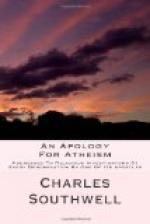Christian practice is after all, the best answer to Christian theory. Men who think wisely, do not it is true, always act wisely; but generally speaking, the moral, like the physical tree, is known by its fruit, and bitter, most bitter, is the fruit of that moral tree, the followers of Jesus planted. Notwithstanding their talk about the pure and benign influence of their religion, an opinion is fast gaining ground, that Bishop Kiddor was right, when he said, ’were a wise man to judge of religion by the lives of its professors, perhaps, Christianity is the last he would choose.’
No unprejudiced thinker who is familiar with the history of religion will deny, that of all priests in this priest-ridden world Christian priests are the worst. Though less potent they are not much less proud or ambitious than when Pope Pascal II. told King Henry I. that all ecclesiastics must enter into the church through Christ and Christ alone, not through the civil magistrate or any profane laymen. Nor are they less jealous of such as would fain reduce the dimensions of their ‘spiritual jurisdiction,’ than when that haughty Pope reminded his king that ‘priests are called God in Scripture as being the vicars of God;’ while in consideration for the poor and the oppressed, modern priests are disadvantageously distinguished, from those ‘vicars of God,’ who trod upon the necks of emperors and kings, made or unmade laws at pleasure, and kept Europe, intellectual Europe, in unreasoning, unresisting subjection. The reader who agrees with Milton that
To
know, what every day before us lies,
Is
the prime wisdom,
will in all likelihood not object to cast his eyes around and about him, where proofs of modern priestly selfishness are in wonderful abundance. By way of example may be cited the cases of those right reverend Fathers in God the Bishops of London and Chester, prelates high in the church; disposers of enormous wealth with influence almost incalculable; the former more especially. And how stand they affected towards the poor? By reference to the Times newspaper of September 27th, 1845, it will be seen that those very influential and wealthy Bishops are supporters en chef of a ‘Reformed Poor Law,’ the ‘virtual principle’ of which is ’to reduce the condition of those whose necessities oblige them to apply for relief, below that of the labourer of the lowest class.’ A Reformed Poor Law, having for its ‘object,’ yes reader, its object, the restoration of the pauper to a position below that of the independent labourer.’ This is their ‘standard’ of reference, by rigid attention to which they hope to fully carry out their ‘vital principle,’ and thus bring to a satisfactory conclusion the great work of placing ’the pauper in a worse condition than the independent labourer.’ It appears, from the same journal, that in reply to complaints against their dietary, the Commissioners appointed to work




